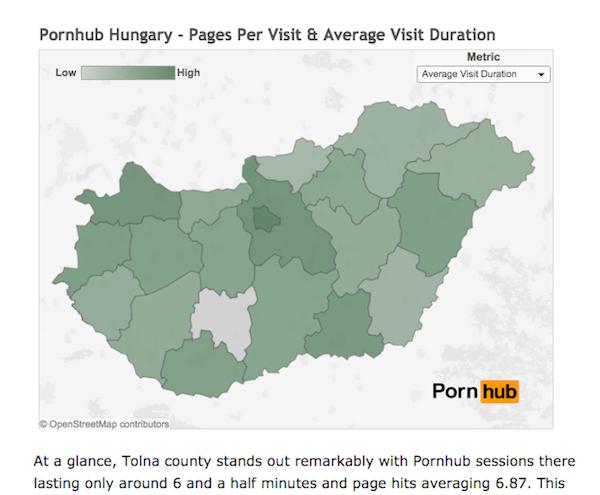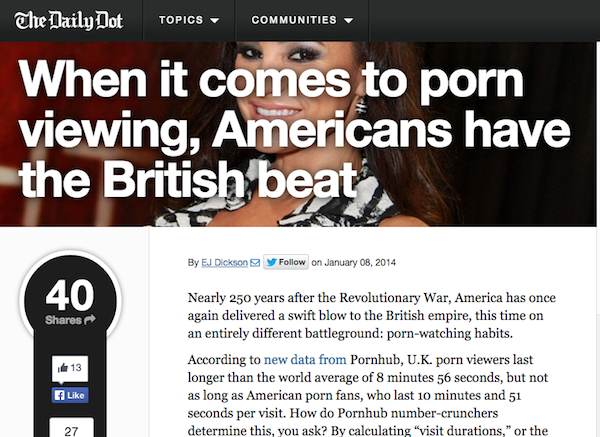
Pornhub knows great content when it sees it. And these days nothing in publishing is sexier than data.
The adult website launched its data-driven blog Insights in the summer of 2013. The blog unearths interesting data points about its users’ viewing habits that have made for some titillating while safe-for-work reading.
Pornhub initially saw Insights as a way to entertain its existing users. But as the response took off, it recognized the blog’s use as a marketing tool. It sought to use media outlets to widen the blog’s distribution — and mainstream news outlets have proved willing partners.
“Our first huge data dump was a 2012 year-in-review, and while it was merely experimental, we saw the media coverage explode,” Pornhub vp Corey Price said. “Turns out it wasn’t a fluke, as we saw that when we diversified the offerings using different angles, it kept happening. This told us that the media was super receptive and actually championed our efforts as something unique.”
To get wider pickup for its content, Pornhub started creating country-specific posts like these on porn-watching habits of Hungary, France and Mexico.
Pornhub has also provided stats that have served as the basis for stories in publications including BuzzFeed, Mashable and Vice, whose focus on the intersection of tech and lifestyle makes them a logical home for Pornhub’s content.
The Daily Dot, for one, has published a number of stories using Pornhub data, including “When it comes to porn viewing, Americans have the British beat.”
“I cover sex and tech and, often, the adult industry, and Pornhub is one of the biggest adult websites in the world, so it’s a no-brainer to reach out to them,” said E.J. Dickson, a staffer at the Daily Dot and author of a number of Pornhub-aided posts.
Even Quartz, which bills itself as a business news brand for the globetrotting executive, has gotten in on the action, working with Pornhub to publish this post about porn habits in India.
The publishers are getting plenty of benefit from the posts, from available evidence. This one on Mashable on a state-by-state breakdown of how long people spend with porn received a healthy 1,500 shares. On Gizmodo, “Which Browser’s Users Are the Most Porn-Crazed?” got a respectable 113,945 views.
The exposure Pornhub has gotten from its content push has had a “huge impact” on traffic to its insights site as well, said Price. As a result, traffic to Insights has tripled over the past year, to an average of 300,000 monthly uniques, according to the site. The traffic also helps to measure the success of the data and analytics Pornhub puts out. “It works because it lets us reach wider audiences,” he said.
The content push dovetails with a growing number of mainstream marketing schemes by Pornhub aimed at broadening its awareness and destigmatizing the subject. They range from movie product placement to non-porn initiatives such as an ad design contest and a tree-planting effort. Along the way, the site has attracted mainstream advertisers such as the movies “Don Jon” and “21 and Over” and food-delivery service Eat24.
The popularity of porn notwithstanding, Pornhub’s content is still controversial, and pushing its content out there could risk a backlash from those who believe porn objectifies women and is bad for relationships.
“Content marketing/storytelling/data-based research is probably a good strategy to build their brand reputation, but it’s not going to convince someone like me to get into porn,” said Shane Snow, chief creative officer at content-marketing firm Contently. “They’re making a play to get mindshare from their competitors. Fortunately for them, lots of people like porn, so there’s a big opportunity there.”
Homepage image courtesy of Shutterstock /Dianka Pyzhova
More in Media

In Graphic Detail: The scale of the challenge facing publishers, politicians eager to damage Google’s adland dominance
Last year was a blowout ad revenue year for Google, despite challenges from several quarters.

Why Walmart is basically a tech company now
The retail giant joined the Nasdaq exchange, also home to technology companies like Amazon, in December.

The Athletic invests in live blogs, video to insulate sports coverage from AI scraping
As the Super Bowl and Winter Olympics collide, The Athletic is leaning into live blogs and video to keeps fans locked in, and AI bots at bay.







